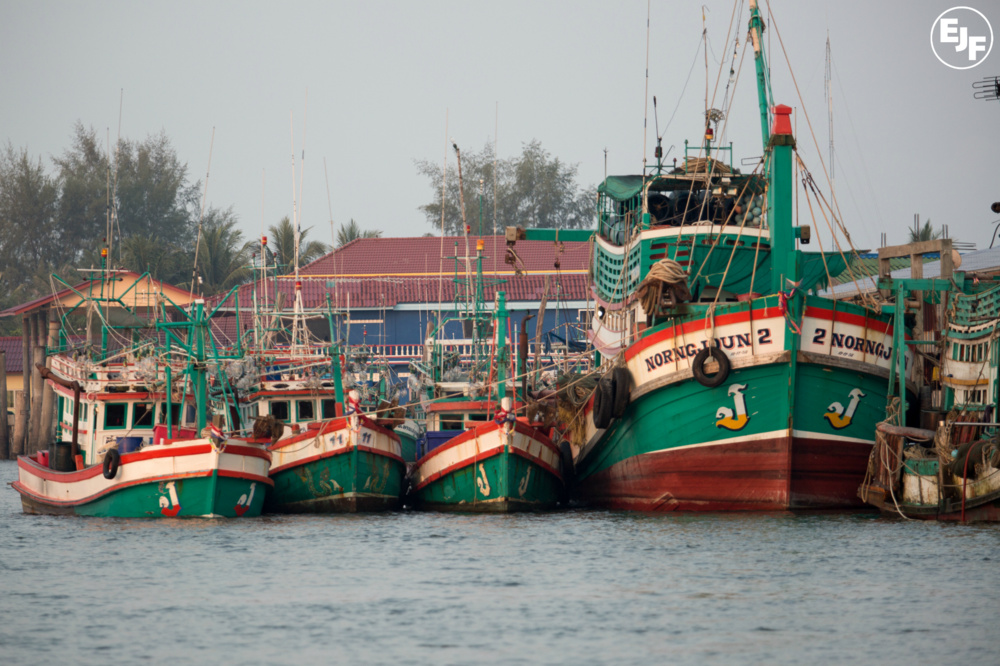
Korean Ministry of Oceans and Fisheries, EJF and WWF to host regional conference addressing unsustainable and illegal fishing
High-level officials from across Asia will gather at a conference in Seoul, Korea this month (29-30 Nov) in a strong move to boost action and collaboration to combat unsustainable and illegal fishing across the region.
Co-hosted by the Korean Ministry of Oceans and Fisheries, Environmental Justice Foundation (EJF) and WWF the conference “Building Ocean Health: Sharing experiences to move towards sustainable fisheries management” will bring together high-level officials from Asian States including Korea, Thailand, Indonesia, Cambodia and Sri Lanka.
They will also be joined by representatives from the EU and US, and international organisations including the UN Food and Agriculture Organization and the North Pacific Fisheries Commission.
Globally, fisheries are under serious threat. Almost 30% of all fisheries are overexploited and another 60% fully exploited. Illegal, Unreported and Unregulated (IUU) fishing is further aggravating this threat, costing between an estimated US$10 billion and US$23.5 billion in economic losses every year and leading to severe and widespread human rights abuses, including forced labour, violence and even murder.
"Across the Asian region unscrupulous rogue fishing vessels and companies are engaged in IUU fishing, avoiding controls and ignoring laws so that they can maximise short-term profits at the cost of the long-term sustainability of fisheries. Greater action and collaboration to eradicate these "pirate" fishing operations is urgently needed and we applaud the initiative of the Government of South Korea to lead in bringing Governments together in this conference to share intelligence, identify best practices and build the collaboration that is so important to securing the long-term sustainability and security of fisheries.” Steve Trent, EJF Executive Director
“Asian countries have a critical role to play in re-building ocean health and sustainable fisheries. A healthy ocean is vital in so many ways – from its role in feeding billions of people, to providing millions of jobs, to generating trillions of dollars for the world economy, to tackling climate change – so the current trends on fisheries and ocean health are extremely alarming. The good news is that solutions do exist, so we welcome this opportunity to bring key players together, to discuss issues and develop a concrete action plan for the future because there is no time to lose.“ John Tanzer, WWF Oceans Practice Leader
Accounting for 55% of global fishery product, Asian countries are vital players in securing sustainable fisheries and tackling the growing challenge of illegal fishing. Yet many of the region’s governments continue to face international criticism as they struggle to regulate and control their fishing fleets.
After being an awarded a ‘yellow card’ by the EU for its failure to control IUU vessels in 2013, the Korean government enacted bold new amendments to its Distant Water Fisheries Development Act. The changes offer the government greater control over all IUU vessels, and increased its ability to act when Korean nationals engage in illegal fishing outside of its jurisdiction.
“Korea has been making its best efforts to combat IUU fishing since a ‘yellow card’ was given. As a result, the yellow card has been lifted within a short period of time. Now, Korean would like to become an exemplary fishing country. Combatting IUU will not be achieved without cooperation. We hope this conference will be an opportunity to explore effective cooperation to combat IUU fishing.” Shin-hee Cho, Director General, Ministry of Oceans and Fisheries in Korea
The conference will provide an opportunity for other countries to learn from Korea, and for Asian states to share knowledge, intelligence, best practices and experience in order to help drive greater action and collaboration across the region.
The key objectives of the conference include:
- Developing a dialogue and information-sharing between Asian States
- Considering the relevance of Korean reforms in other Asian States
- Promoting key reforms to global fisheries governance
- Creating a regional approach and initiatives to combat and deter IUU fishing
- Building understanding on the overall steps needed to achieve sustainable fisheries management
Notes for Editors
- Nearly 3 billion people depend upon fish for food and nutrition. Fisheries and aquaculture assure the livelihoods of 10-12% of the world’s population.
- The ocean generates economic benefits worth at least US$2.5 trillion per year.
- Unsustainable and illegal fishing practices threaten food security and undermine efforts to reduce global hunger and malnutrition, especially in developing countries.
- IUU fishing includes fishing without a licence, under-reporting catch or catching prohibited species, operating with illegal fishing gears such as drift nets in marine protected areas, or in areas reserved for artisanal fishers.
- Global losses due to Illegal, Unreported and Unregulated (IUU) or ‘pirate’ fishing are estimated to be between US$10 billion and US$23.5 billion annually - as much as a fifth of the value of the total global catch.
- Between 11 and 26 million tonnes of fish are caught illegally a year, which corresponds to at least 15% of world catches.
- Pirate fishing vessels, including large industrial trawlers, deplete fish stocks, destroy marine ecosystems and put legitimate fishers at an unfair disadvantage.
- Under the EU’s IUU regulation countries identified as having inadequate measures in place to ensure catch is legal may be issued with a formal warning (yellow card) to improve. If they fail to do so, they face having their fish banned from the EU market (red card). On making required improvements, they are delisted (green card).
SIGN UP FOR OUR EMAILS AND STAY UP TO DATE WITH EJF